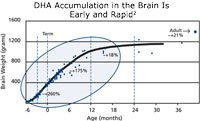Docosahexaenoic acid (DHA) is an omega-3 fatty acid that is an important structural element of the central nervous system and retina. The need for DHA may be most critical for brain and eye development from conception through the second year of life. Significant brain growth occurs during the third trimester of pregnancy and through the first two years of life. This is a time of rapid accumulation of DHA over EPA in an infant’s brain.
Supplementation with DHA, whether from fish oil or algal oil vegan sources, has been shown to increase DHA levels in both the blood and milk of pregnant women.3,4,5 Therefore, although DHA supplementation is indicated in anyone who does not eat fish regularly; it is especially important for pregnant and nursing women and their infants to support structural development of their babies’ brain and eyes.


Benefits for Breastfed Babies’ Brains
The children of mothers who received DHA for the first four months of breastfeeding were tested and compared to the children of mothers who consumed a placebo with results as follows:
• At 2.5 years of age, they were found to have enhanced psychomotor development.4
• At 4 years of age, they showed improved intelligence scores.6
• In their fifth year of life, they performed better on some sustained attention tests.7

DHA Current Intakes and Recommendations
• The average intake of DHA by pregnant or nursing women in the U.S. is about 54 mg/day.8
• While a daily value for DHA has not yet been established, expert panels have recommended at least 200 to 300 mg DHA/day for pregnant and nursing women.9,10
• Although there are no official intake recommendations for DHA in children, studies showed that actual intakes are far less than adequate for optimal growth and development. While most experts recommend at least 100 to 150 milligrams of DHA for kids per day, actual intakes appear to be closer to 20 to 50 milligrams per day only.11 Dietary DHA sources include foods such as salmon, tuna, and other fatty fish. A 3 oz serving of salmon provides about 600 mg of DHA.
• The FDA and EPA have advised pregnant and nursing women to avoid certain fish due to mercury levels, and to eat up to 12 ounces per week of a variety of fish and shellfish that are lower in mercury.12
• DHA from agal oil (MartekTM) offer a vegan, environmentally sustainable and toxin free alternative to fish oils. This DHA source accepted as GRAS (Generally Recognized as Safe) by the U.S. Food and Drug Administration for use in infant formula.
Synergistic Considerations
Omega-3 fatty acids are polyunsaturates (PUFA) and, as such, are highly liable to oxidation. Therefore, coincident supplementation with vitamin E, a lipid antioxidant, is to be strongly considered. Also, as fatty fish is a major source of dietary vitamin D, inclusion of vitamin D in the supplementation schedule is also to be strongly considered in those supplementing with fish oil, partly because they do not frequently consume fatty fish. At the same time, vitamin A intake is to be limited because of its teratogenic potential. For vegans, meat and fish are major sources of folic acid and vitamin B12, so supplementing these as well, may be important. Indeed, as neural tube defects occur early in pregnancy, folate status is an important consideration in all fecundate females.
Delivery Forms
Fortunately, today there are many ways to supplement DHA. Formats include small easy to swallow capsules, gummies, ready to mix powdered drinks and inclusion in foods like OJ and yogurt. Some of these formats also provide vitamins D, E and/or folate and B12.
Closing Remarks
As doctors of chiropractic, we are especially concerned with the optimal function of the nervous system. As such, given the important time window for optimal DHA supplementation in the fetus and infant and its relation to brain development, it behooves us to consider sharing this information with our female patients of childbearing age.
Dr. John H. Maher is co-founder of BioPharma Scientific and creator of “The SuperFood Solution™: Lifelong Wellness Made Easy” (www.superfoodsolution.com). He can be reached by email at [email protected].
